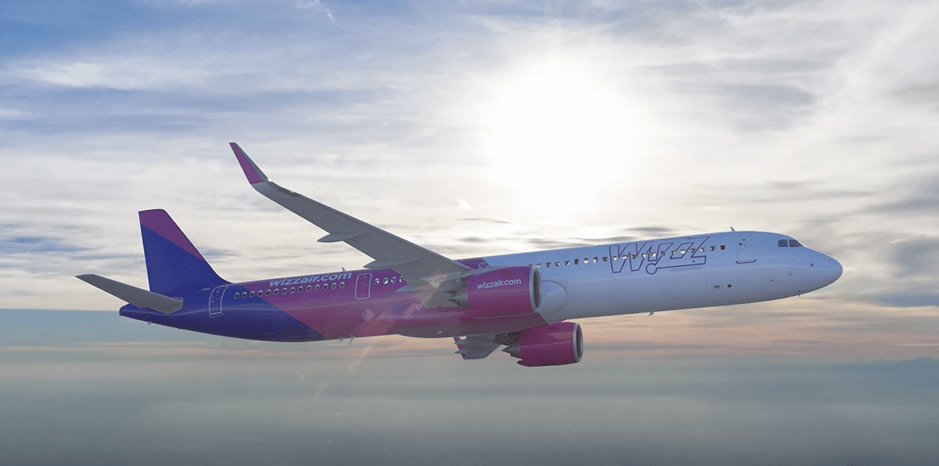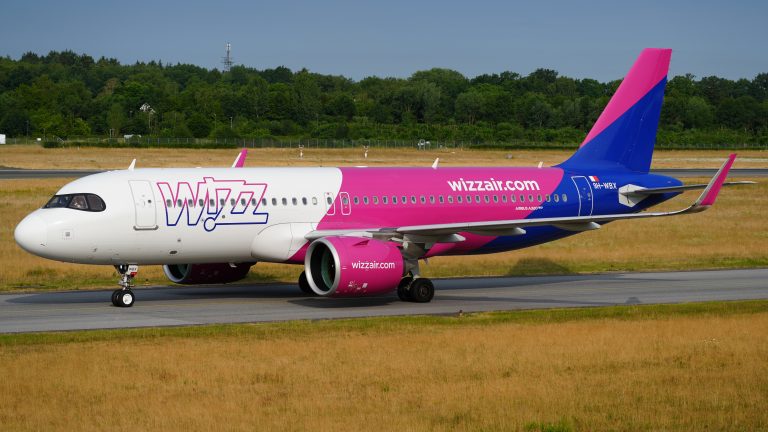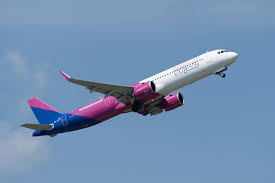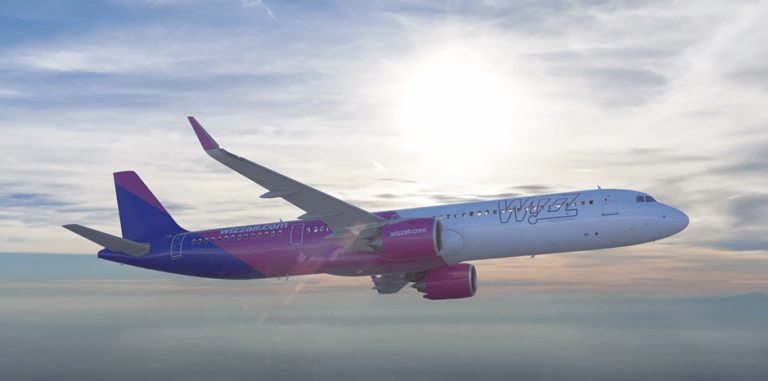Wizz Air Holdings Plc (LON:WIZZ), one of the most sustainable European airlines, has issued unaudited results for the three months to 30 June 2024.
| For the three months ended 30 June | 2024 | 2023 | Change |
| Period-end fleet size | 218 | 182 | 19.8% |
| ASKs (million km) | 29,179 | 29,544 | (1.2)% |
| Load factor (%) | 91.0 | 91.2 | (0.1)ppt |
| Passengers carried (million) | 15.35 | 15.27 | 0.5% |
| Total revenue (€ million) | 1,259.3 | 1,236.6 | 1.8% |
| EBITDA (€ million)1 | 274.6 | 236.7 | 16.0% |
| EBITDA Margin (%)1 | 21.8 | 19.1 | 2.7ppt |
| Operating profit for the period (€ million) | 44.6 | 79.9 | (44.2)% |
| Net profit for the period (€ million) | 1.2 | 61.1 | (98.0)% |
| RASK (€ cent) | 4.32 | 4.19 | 3.1% |
| Total CASK (€ cent) | 4.30 | 4.02 | 7.0% |
| Fuel CASK (€ cent) | 1.58 | 1.50 | 5.0% |
| Ex-fuel CASK (€ cent) | 2.72 | 2.51 | 8.2% |
| Total cash (€ million)1,2 | 1,838.4 | 1,588.9 | 15.7% |
| Net debt (€ million)1,3 | 4,828.6 | 4,790.1 | 0.8% |
1 For further definition of non-financial measures presented refer to “Alternative performance measures (APMs)” and “Glossary of terms” sections of this document.
2 Comparative figure is total cash balance as at 31 March 2024. Total cash is a non-statutory financial performance measure and comprises cash and cash equivalents (30 June 2024: €1,117.4 million; 31 March 2024: €728.4 million), short-term cash deposits (30 June 2024: €610.9 million; 31 March 2024: 751.1) and total current and non-current restricted cash (30 June 2024: €110.2 million; 31 March 2024: €109.4 million).
3 Comparative figure is net debt balance as at 31 March 2024.
HIGHLIGHTS
▶ASK capacity 1.2 per cent lower in Q1 F25 vs last year, in line with guidance.
▶Carried 15.3 million passengers in Q1 F25 (vs 15.3 million in Q1 F24), with a load factor of 91.0 per cent.
▶Total unit revenue (RASK) increased by 3.1 per cent to €4.32 cents with ticket RASK up by 3.2 per cent to €2.41 cents and ancillary RASK up by 2.9 per cent to €1.91 cents yoy.
▶EBITDA increased by 16.0 per cent to €274.6 million, with margin expansion to 21.8 per cent.
▶Operating profit down to €44.6 million (vs €79.9 million in Q1 F24), impacted by higher depreciation costs and €39m in one-off wet lease costs contracted to protect routes during the GTF engine -related groundings.
▶Net profit down to €1.2 million, impacted by unrealised foreign exchange headwind yoy.
▶Total cash balance increased by 15.7 per cent vs end of March 2024, to €1,838.4 million and net debt remained stable at €4,828.6 million, and leverage ratio falling below 4.0x.
▶GTF engine inspections: 46 aircraft grounded at the end of June 2024, with peak aircraft groundings now expected to be 47 vs previous assumption of 50; OEM compensation received for the quarter in line with expectations.
József Váradi, Wizz Air Chief Executive Officer commented on business developments in the period:
“Our performance this quarter demonstrates the resilience of Wizz Air’s ultra-low-cost business model. Despite the competitive landscape and ongoing supply chain challenges, our strategic focus on delivering the lowest fares, improving our route network, and maintaining high operational efficiency has yielded results.
We have made significant operational strides this quarter, achieving a 99.8 per cent completion and a 67.6 per cent on-time performance rate, up 7.1 ppts from last year. This improvement is the result of our continuous investment in technology, staff training and infrastructure enhancements. We successfully operate almost 800 routes in over 50 countries between 33 bases across Europe and the Middle East.”
The well documented issues relating to Pratt & Whitney’s GTF engines led to the grounding of an average of 46 neo aircraft over the quarter. However, Wizz Air still carried 15.3 million passengers over the three months ending June, up 0.5% year-on-year, while total revenue increased by 1.8 per cent to €1,259.3 million. These results underline the sustained demand for our services across Europe and our ability to offer the best value to our customers. Our load factor came in at 91.0 per cent, while total unit revenue (RASK) increased by 3.1 per cent to €4.32 cents, reflecting the focus on overall revenue management.
Cost per available seat kilometre (CASK), excluding fuel, increased by 8.2 per cent to €2.72 cents, substantially reflecting the aircraft groundings and the cost of strategic wet leases. These were secured to protect our market positions during the peak summer season, and to ensure that our customers were able to rely on a stable network.
Our financial performance remains solid, with EBITDA rising by 16.0 per cent versus previous quarter to €274.6 million and net debt stable at €4,828.6 million.
On current trading and the outlook, Mr Váradi added:
“Looking ahead, capacity is stabilizing and we are focusing on further optimizing our operations, with an emphasis on improving our most profitable bases and enhancing efficiency.
We remain optimistic about the demand outlook, with both ticket and ancillary RASK expected to be up year-on-year while load factor is maintained above 90%.
We remain on track to return to annual capacity growth in F26, underpinned by the pipeline of Airbus deliveries.”
NEAR-TERM AND FORWARD OUTLOOK
The near-term and full-year outlook is summarised as follows:
▶Capacity (ASKs): H1 F25 flat YoY, H2 F25 flat YoY;
▶Load factor: F25 92 per cent;
▶Revenue: F25 RASK up mid-single digit YoY;
▶Costs: F25 ex-fuel CASK up high single digit YoY; and F25 fuel CASK flat YoY;
▶Net income: F25 in the range of €350-450 million
▶Group corporate effective tax rate (ETR): 14 per cent.
GTF ENGINE UPDATE
As of 30 Jun 2024, Wizz Air had 46 aircraft on ground due to GTF engine-related inspections. Peak aircraft groundings are now expected to be 47 aircraft in September 2025, with this the current basis for forecasting over the next 18 months as against the previous assumption of 50. Forecasts are still based on a 300-day engine turnaround time, but future updates should reduce this.
Wizz Air received 14 GTF spare engines in Q1 F25 and is expecting a further 2 to limit the grounding of the neo aircraft fleet, with the total GTF spare pool to exceed 56 by the end of summer 2024. Variation in fleet numbers have reflected impact of quick-turn engine returns in Q1 F25.
The company is managing fluctuations in fleet, as compensation payments do not cover period to redeploy aircraft once engines returned. Management is in negotiations with regards engine return targets for next year, as well as compensation rates and structure.
FLEET UPDATE
▶During Q1 F25 Wizz Air took delivery of 9 new A321neo aircraft, dry-leased 3 A320ceo aircraft, and redelivered 2 A320ceo aircraft, ending the period with a total fleet of 218 aircraft: 41x A320ceo, 41x A321ceo, 6x A320neo and 130x A321neo.
▶Wizz Air secured 8 wet-leased aircraft for periods ranging from six to twelve months, to maintain its network footprint while aircraft are grounded due to GTF engine inspections.
▶The average age of the fleet currently stands at 4.3 years, the youngest fleet among major European airlines, while the average number of seats per aircraft has climbed to 225 as at June 2024.
▶The share of new “neo” technology aircraft within Wizz Air’s fleet has increased to 62 per cent.
▶As at 30 June 2024, Wizz Air’s delivery backlog comprises a firm order for 13x A320neo, 257x A321neo and 47x A321XLR aircraft, a total of 317 aircraft.
▶Airbus updated the market on its revised manufacturing output on 25 June 2024. While the airline’s long-term growth plan remains unchanged, Wizz Air anticipates that this could impact the scheduled fleet program in the coming years, as previously indicated: expecting 30-35 aircraft to be delayed from F26.
FINANCIAL UPDATE
▶During the quarter Wizz Air continued to apply its jet fuel and foreign currency hedging policy. As of 26 July 2024, Wizz Air has a hedge coverage of 65 per cent for its jet fuel needs for F25 using mostly zero-cost collars at a price of 748/857 $/mT and jet fuel swaps at a price of 808 $/mT. For F26, the coverage is 19 per cent at the price of 736/843 $/mT. The jet fuel-related EUR/USD FX coverage stands at 65 per cent for F25 at 1.08/1.12, while the coverage for F26 stands at 19 per cent at 1.08/1.12 rates.
▶The Group’s credit rating stands at BBB- by Fitch Ratings and Ba1 stable by Moody’s Investor Services.
▶The outstanding balance on the PDP credit facility at the end of 30 June 2024 stands at $197.2 million (30 June 2023: $196.7 million).
▶The balance of EU emissions trading scheme credits repurchase agreement remains unchanged, at €253.6 million. The inventory must be repurchased from the counterparty by September 2024.
▶Wizz Air continued to receive OEM compensation from Pratt & Whitney related to the GTF engine issues and it is presented within net other income/(expense) in the consolidated statement of comprehensive income.
1 For further definition of non-financial measures presented refer to “Alternative performance measures (APMS)” and “Glossary of terms” sections of this document.
ESG UPDATE
▶12 months rolling CO2 emission per passenger kilometre remain trending down at 52.3 grammes (vs 52.5 grammes in the preceding 12 months), the lowest among peers in the industry.
▶Wizz Air was named the Most Sustainable Low-Cost Airline for the fourth consecutive year at the World Finance Sustainability Awards 2024.
▶During the quarter, Wizz Air concluded the inaugural term of its first of its kind Sustainability Ambassador Programme and has just announced application for the second term.








































